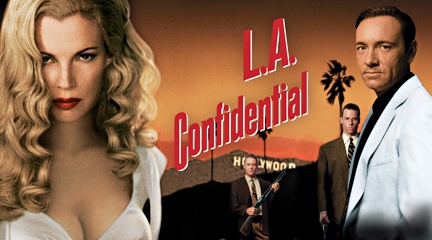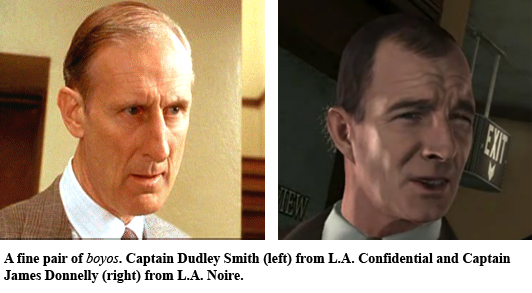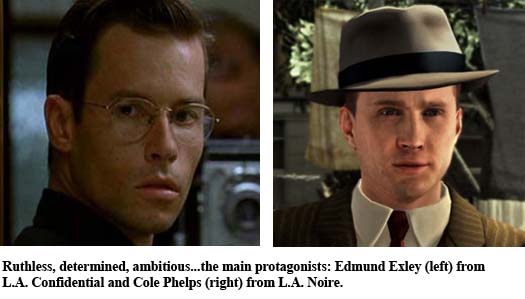This post has not been edited by the GamesBeat staff. Opinions by GamesBeat community writers do not necessarily reflect those of the staff.

“'Come to Los Angeles! The sun shines bright, the beaches are wide and inviting, and the orange groves stretch as far as the eye can see. There are jobs aplenty, and land is cheap. Every working man can have his own house…life is good in Los Angeles… it's paradise on Earth.' Ha ha ha ha. That's what they tell you, anyway.”
– Sid Hutchens, L.A. Confidential
L.A. Noire has many forebears, but one stands tall above the rest: Curtis Hanson’s L.A. Confidential, which is based on the hardboiled detective novel by James Ellroy. Both exude atmosphere that drips with darkness, despair, and cynicism. Everyone has something to hide; the good guys are bad, and the bad guys are worse. While Team Bondi’s masterpiece draws inspiration from classic film noir, Raymond Chandler, and others, it’s L.A. Confidential that informs the bulk of L.A. Noire’s characters, settings, and mood.
Both properties peel back the glossy facade of Los Angeles and deconstruct the glitz and glamour of the apocryphal “paradise on earth” to reveal its corrupt underbelly. Thus, the true L.A. emerges — replete with the racism, cultural strife, and police corruption endemic to the period. The result is an unparalleled sense of immersion and atmosphere, and the fact that I can draw comparisons between the two speaks volumes to what Team Bondi was able to accomplish.
The similarities are so blatant that I fully expected to hear Danny Devito narrate L.A. Noire’s opening cinematic (see above quote). It has a number of characters and themes which were drawn directly from Ellroy’s pen and Hanson’s celluloid. Capt. Donnelly, with his clearly enunciated “boyos,” is an obvious nod to James Cromwell’s Captain Dudley Smith. Apart from the height difference (Cromwell is a massive 6’7”), and Dudley’s extracurricular activities, the two are a spot-on match.

Close parallels can be drawn between both protagonists: Confidential’s Edmund Exley and Noire’s Cole Phelps. The two are political animals obsessed with cracking the big case and rising through the ranks. Their ambition, privileged above all else (including peer relations), earns them derision within their respective departments. Exley devotes himself to absolute justice, which leads him to rat out his colleagues in the “Bloody Christmas” fiasco and earn a promotion in the process. Phelps, meanwhile, is one of the few honest cops in the LAPD. His squeaky-clean veneer fosters an atmosphere of distrust among colleagues. Both have spotty war records which are marred by citations of questionable veracity.

L.A. Confidential has two major action sequences and a number of smaller ones. Thus far, video games have fallen short in the pacing department — a given when your primary inspiration is brainless action flicks. But L.A. Noire nails it. Most of the game plays out like a police procedural, more akin to NYPD Blue than Die Hard. You spend the majority of the game chasing down leads (along with fleeing suspects) and interrogating persons of interest. You don’t mow down thousands of bad guys, and you don’t shoot up half the city without repercussions. In fact, the game discourages you from committing excessive collateral damage.
Roy Earle, your corrupt vice partner, is clearly modeled after Sergeant Jack Vincennes (Kevin Spacey) from L.A. Confidential. Vincennes, i.e. “Hollywood Jack”, serves as the technical advisor for Badge of Honor (a Dragnet lookalike). He also scams for Sid Hutchens and Hush Hush magazine by staging drug busts of Hollywood celebs. Roy Earle is “on the take,” but unlike Vincennes, your erstwhile partner is completely unlikeable and irredeemable. Vincennes has lost sight of what led him to police work. He earns a measure of redemption in the end, while Earle remains an unrepentant bastard.

The above examples just scratch the surface. The similarities between these two run deep. If you haven’t seen L.A. Confidential, I’d highly recommend tackling it prior to L.A. Noire, as you may miss many of the allusions otherwise.
